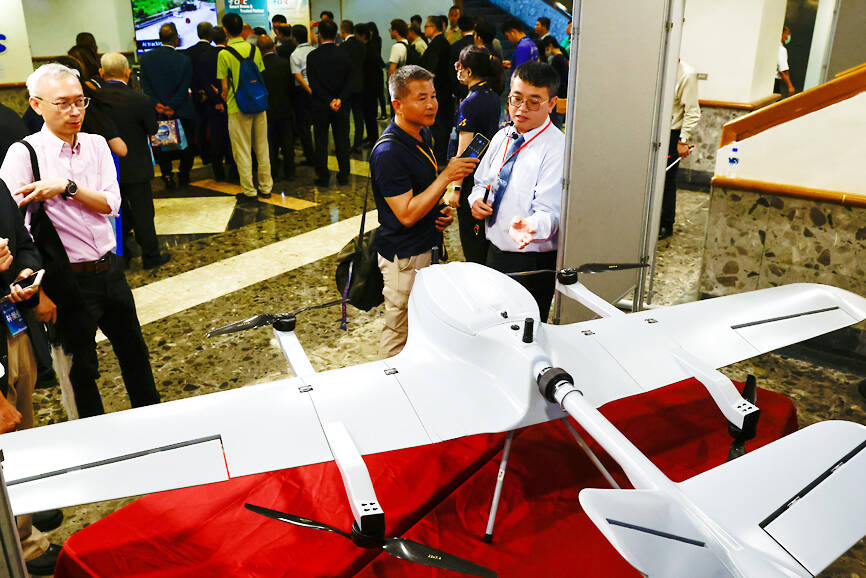Taiwan’s drone exports surged nearly 750 percent in the first half of this year, with Poland emerging as the largest buyer, as European nations increased orders in response to the EU’s growing emphasis on defense and cybersecurity, the Taiwan External Trade Development Council (TAITRA, 外貿協會) said.
Taiwan exported US$11.89 million of drones in the first half of the year, up 749 percent from a year earlier, with Poland purchasing more than 54 percent of the total at US$6.48 million, according to Customs administration data.
The US followed as the second-largest buyer, importing US$1.55 million of drones, a 209 percent increase from the previous year, while Germany ranked third with purchases of US$1.46 million, a 258-fold increase from a year earlier.

Photo: Ritchie B. Tongo, EPA-EFE
The Czech Republic, which began importing Taiwan-made drones earlier this year, ranked fourth with US$1.04 million in purchases, followed closely by Hong Kong, which imported US$1 million of drones, a 36.9 percent rise from last year.
Together, the top five buyers accounted for about 97 percent of Taiwan’s total drone exports during the six-month period, the data showed.
TAITRA, a government-backed trade promotion group, said that as geopolitical tensions rise, European countries are increasingly turning to non-Chinese suppliers to strengthen defense and cybersecurity, develop key components and establish a “non-red” supply chain.
In the wake of the escalating Ukraine-Russia conflict and rising tensions in the Middle East, the EU has increasingly turned its focus to Taiwan-made drones, attracted by the country’s expertise in information and communications technology and proven manufacturing capabilities, the alliance said.
Taiwan’s strong democratic values have also appealed to like-minded buyers in Europe, it added.
As demand rises from Europe, drones are being used for military applications, including border security, homeland monitoring and anti-drone defense, while the private sector adopts them for agriculture, infrastructure inspections and urban surveillance, TAITRA said.
European governments and companies are seeking reliable drone suppliers, and Taiwan has seized the opportunity to enter the market, it said.
The Taiwan Excellence Drone International Business Opportunities Alliance (TEDIBOA) was established in September last year, with more than 120 members specializing in areas such as drone system integration and critical component development.
The alliance has helped coordinate members’ efforts to promote their products internationally. While Chinese drones are cost-effective, an industry source said that the increasing demand for secure, non-Chinese supply chains has enabled Taiwanese suppliers to make inroads in European and US markets.
TEDIBOA members specialize in drone assembly, module and battery development, and ground equipment, the source said.
Through vertical and horizontal integration, Taiwanese manufacturers can quickly meet client needs, they said.

DAREDEVIL: Honnold said it had always been a dream of his to climb Taipei 101, while a Netflix producer said the skyscraper was ‘a real icon of this country’ US climber Alex Honnold yesterday took on Taiwan’s tallest building, becoming the first person to scale Taipei 101 without a rope, harness or safety net. Hundreds of spectators gathered at the base of the 101-story skyscraper to watch Honnold, 40, embark on his daredevil feat, which was also broadcast live on Netflix. Dressed in a red T-shirt and yellow custom-made climbing shoes, Honnold swiftly moved up the southeast face of the glass and steel building. At one point, he stepped onto a platform midway up to wave down at fans and onlookers who were taking photos. People watching from inside

A Vietnamese migrant worker yesterday won NT$12 million (US$379,627) on a Lunar New Year scratch card in Kaohsiung as part of Taiwan Lottery Co’s (台灣彩券) “NT$12 Million Grand Fortune” (1200萬大吉利) game. The man was the first top-prize winner of the new game launched on Jan. 6 to mark the Lunar New Year. Three Vietnamese migrant workers visited a Taiwan Lottery shop on Xinyue Street in Kaohsiung’s Gangshan District (崗山), a store representative said. The player bought multiple tickets and, after winning nothing, held the final lottery ticket in one hand and rubbed the store’s statue of the Maitreya Buddha’s belly with the other,

‘NATO-PLUS’: ‘Our strategic partners in the Indo-Pacific are facing increasing aggression by the Chinese Communist Party,’ US Representative Rob Wittman said The US House of Representatives on Monday released its version of the Consolidated Appropriations Act, which includes US$1.15 billion to support security cooperation with Taiwan. The omnibus act, covering US$1.2 trillion of spending, allocates US$1 billion for the Taiwan Security Cooperation Initiative, as well as US$150 million for the replacement of defense articles and reimbursement of defense services provided to Taiwan. The fund allocations were based on the US National Defense Authorization Act for fiscal 2026 that was passed by the US Congress last month and authorized up to US$1 billion to the US Defense Security Cooperation Agency in support of the

‘COMMITTED TO DETERRENCE’: Washington would stand by its allies, but it can only help as much as countries help themselves, Raymond Greene said The US is committed to deterrence in the first island chain, but it should not bear the burden alone, as “freedom is not free,” American Institute in Taiwan Director Raymond Greene said in a speech at the Institute for National Defense and Security Research’s “Strengthening Resilience: Defense as the Engine of Development” seminar in Taipei yesterday. In the speech, titled “Investing Together and a Secure and Prosperous Future,” Greene highlighted the contributions of US President Donald Trump’s administration to Taiwan’s defense efforts, including the establishment of supply chains for drones and autonomous systems, offers of security assistance and the expansion of